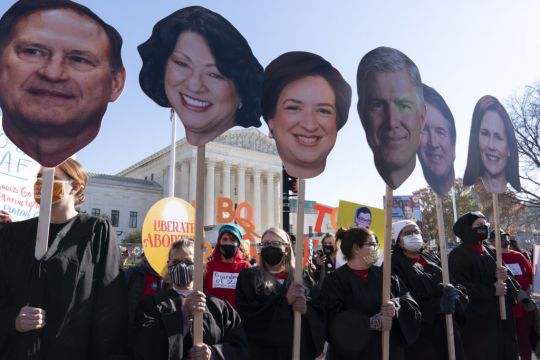The US Supreme Court’s conservative majority have signalled they will allow states to ban abortion much earlier in pregnancy and may even overturn the nationwide right that has existed for nearly 50 years.
With hundreds of demonstrators outside chanting for and against, the justices led arguments that could decide the fate of the court’s historic 1973 Roe vs Wade decision legalising abortion throughout the US and its 1992 ruling in Planned Parenthood vs Casey, which reaffirmed Roe.
The outcome will probably not be known until next June, but after nearly two hours of arguments, all six conservative justices, including three appointed by former president Donald Trump, indicated they would uphold a Mississippi law that bans abortion after 15 weeks of pregnancy.

At the least, such a decision would undermine Roe and Casey, which allow states to regulate but not ban abortion up until the point of foetal viability, at roughly 24 weeks.
There was also substantial support among the conservative justices for getting rid of Roe and Casey altogether. Justice Clarence Thomas is the only member of the court who has openly called for overruling the two cases.
Justice Brett Kavanaugh, a Trump appointee, asked whether the court would be better off withdrawing from the abortion issue and letting states decide.
“Why should this court be the arbiter rather than Congress, the state legislatures, state supreme courts, the people being able to resolve this?” he asked.
“And there will be different answers in Mississippi and New York, different answers in Alabama than California.”

Abortion would soon become illegal or severely restricted in roughly half the states if Roe and Casey were overturned, according to the Guttmacher Institute, a research organisation that supports abortion rights.
Legislatures in many Republican-led states are poised for action depending on the Supreme Court’s ruling.
People of colour and lesser means would be disproportionately affected, supporters of abortion rights say.
The court’s three liberal justices said that reversing Roe and Casey would significantly damage the court’s own legitimacy.
“Will this institution survive the stench that this creates in the public perception that the constitution and its reading are just political acts?” Justice Sonia Sotomayor asked.

In unusually strong terms for a high court argument, Justice Stephen Breyer warned his colleagues they “better be damn sure” before they throw away established abortion decisions.
Public opinion polls show support for preserving Roe, though some surveys also find backing for greater restrictions on abortion.
Among the conservatives, Chief Justice John Roberts appeared most interested in a less sweeping ruling that would uphold the Mississippi law but not explicitly overrule Roe and Casey.
“That may be what they’re asking for, but the thing at issue before us today is 15 weeks,” he said, alluding to Mississippi’s call to overturn the broader cases in addition to upholding its own law.
More than 90% of abortions are performed in the first 13 weeks of pregnancy, well before viability, according to the federal Centres for Disease Control and Prevention.
About 100 patients per year get abortions after 15 weeks at the Jackson Women’s Health Organisation, Mississippi’s lone abortion clinic. The facility does not provide abortions after 16 weeks.
Even upholding the 15-week ban would mean rejecting the decades-old viability line. Abortion rights supporters say that would effectively overturn Roe and leave no principled line for when abortions might be banned.







